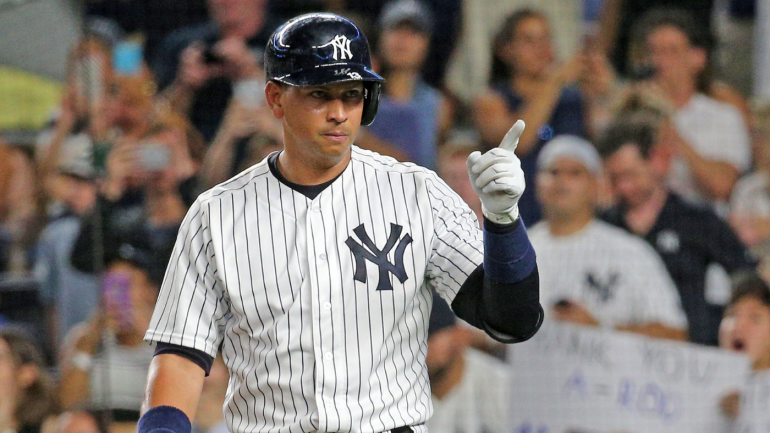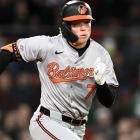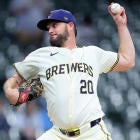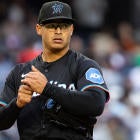
The 2024 Baseball Hall of Fame ballot was revealed on Monday. This is the BBWAA ballot, meaning it features players who have been retired at least five years and those who are holdovers from previous ballots for having received between 5 and 75% of the vote. Here's the full 26-player ballot.
Players who receive less than 5% of the vote fall off the ballot and those with at least 75% will be enshrined in Cooperstown as Hall of Famers next summer. Everyone else will have 10 chances on the ballot to make it in before lapsing. The 2024 Baseball Hall of Fame class will be announced in January.
Let's run through the biggest storylines on the ballot this year.
1. How high will Beltré's percentage be?
I can't see any scenario where Adrián Beltré falls short of the 75% threshold, which means he'll be inducted into the Hall of Fame next summer. He has more than 3,000 hits, over 600 doubles, nearly 500 home runs, more than 1,700 RBI, more than 1,500 runs, two Platinum Gloves and is generally, almost universally loved in the baseball world.
The only real question here is how many voters refuse to check the box next to Beltré's name and what excuse is used when the box isn't checked. We'll probably see something like, "Mike Schmidt got 96.5% of the vote, so Beltré can't be unanimous!" Never mind that voting percentages aren't definitive rankings and voters should just cast ballots based on who should get in without worrying about any other such nonsense.
The bottom line is Beltré will get in, though, otherwise it's a total outrage.
2. Helton likely gets in, but what about Wagner?
Usually when a player gets the kind of momentum Helton has, it leads to induction. Take the recent cases of Larry Walker and Scott Rolen. Todd Helton got only 16.5% of the vote in his first year on the ballot, but watch this progression in vote percentages in just five years: 16.5, 29.2, 44.9, 52, 72.2.
Basically, it would be pretty surprising to see Helton miss the 75% mark this time around. I've covered his case before.
A bigger question here is elite closer Billy Wagner. Wagner has across-the-board better rate stats than Trevor Hoffman (look here for more), but he doesn't have the gaudy save totals or the workload. It's been tough sailing but Wagner has really gotten to the point where he has a realistic shot to make it. After no more than 16.7% in his first four ballots, Wagner rose all the way to 68.1% last year. He's within striking range, but those last few percentage points for a relief pitcher can be awfully difficult and it's his ninth year -- out of a possible 10 -- on the ballot. He might make it this year, but at bare minimum he probably needs to climb up over 72% to have good hope for next time around.
3. Will Beltrán make a big gain?
Carlos Beltrán's numbers say he should have made it in last year, his first time on the ballot. He wasn't connected to PEDs, either, but it was a different scandal that sunk his vote percentage last year. Beltrán was considered one of the ringleaders of the Astros' sign-stealing operation in 2017. I covered his complicated case here.
As a result, he debuted with 46.5% of the vote last year.
The players tied to PEDs seem to plateau at a certain point, depending upon how great their numbers were. Barry Bonds and Roger Clemens got up into the mid-60s. A-Rod might be settling in the mid-30s, though, and Manny Ramirez hasn't gotten more than a third of the vote.
It's tougher to gauge what will happen with Beltrán, because the sign-stealing thing was different than PEDs. Sometimes voters "punish" a player with a one-time refusal to vote and then start ticking the box for him in year two. It seems reasonable to believe a good number of voters did this with Beltrán and will decide to give him a vote this time around. If he sees a big jump, his chances of getting in become realistic. If he ends up in the mid-40s again (46.5% last year), he might be in trouble.
4. A-Rod likely continues to stagnate
Remember, the voting body is ever changing. BBWAA voters can lapse after not covering the sport for a number of years and, of course, some long-time voters die. Meanwhile, new voters join the fray annually, after having done their 10 years of service. I'm one year away from a vote, for example. This is to say that the voting body is ever-changing and the more we move along, the "newer" school the voting body gets.
Still, it wasn't enough for Bonds and Clemens to get all the way to 75%. Also, Alex Rodríguez was suspended due to his ties to PEDs by Major League Baseball, something that never happened to Bonds and Clemens.
A-Rod got 34.3% of the vote in his first year and there was a thought that maybe he suffered from the first-year penalty I mentioned above with Beltrán. Nope. A-Rod got 35.7% of the vote last year.
The best bet is he ends up around 37% this year and that's just not going to cut it, even with seven years left on the ballot.
5. Sheffield's last chance
Gary Sheffield topped out at 13.6% through five years on the ballot. He then jumped all the way to 40.6% in his next two ballots, giving hope for eventual enshrinement. The identical 40.6% in years seven and eight hurt, but the jump to 55% last year gave a little hope.
A 20% bump in his final year on the ballot would be a big one. We've seen it happen before, but I'm not confident it happens here for Sheffield. My bet is he misses out with somewhere around 65% of the vote, meaning he'll have to hope an Era Committee in the future puts him in.
I've long been a Sheffield supporter (even as far back as 2015), but there's only so much I can do for him at this point. Surely everyone's minds are made up by now.
6. Jones looks to continue momentum
One of the greatest defensive players in history, Andruw Jones got only 7.3% of the vote in his first year and 7.5 his second. But it's gone 19.4, 33.9, 41.4 and 58.1 since then. Another 16.7 percentage points rise for Jones this season would put him at 74.8%.
Yeah, this could be very close.
The main thing for Jones now, however, is to see another big jump to get him within striking range. It is his seventh time on the ballot, so it isn't a must to get all the way to 75% this time around.
7. Watch Mauer, Utley and maybe Wright
Aside from Beltré, there are some very good newcomers, such as Matt Holliday, Adrián González and José Bautista. In terms of who can actually get into the Hall of Fame, there are two here with another who has a chance for a bit of a stay on the ballot.
Joe Mauer was a three-time batting champion and MVP as a catcher. He scores out very well in several areas and should make the Hall of Fame someday. It might be this year or it might take several rounds. It's hard to know just yet and I'm having trouble narrowing down a window of voting percentage. Not much above, say, 55% would surprise me.
Chase Utley will not get close to 75% within his first two or three seasons on the ballot. Of that much I'm confident. I do think there's a chance he'll get in eventually and maybe it won't take too much longer. Then again, maybe he won't make it at all. He fell short of 2,000 hits (1,885) and ended with some other modest counting stats like 411 doubles, 259 home runs, 1,025 RBI and 1,103 runs. He's certainly one to watch, though.
I don't think David Wright will ever make the Hall of Fame, as injuries took his chances away not too dissimilar from how they cost Don Mattingly. I do think Wright hangs around a while on the ballot, maybe even the full 10 years. It'll be interesting to see the arguments for him and, eventually, where his vote percentage ends up this year.
8. Playing out the string with Manny, Omar
Former Cleveland teammates Manny Ramírez and Omar Vizquel are in ballot purgatory for different reasons.
Ramírez hit .312 with a 154 OPS+ and collected 547 doubles, 555 homers, 1,831 RBI and two PED suspensions. He languished in the 20s, percentage wise, until jumping to 33.2% last year. I can't see him getting to 40% and he only has three chances left.
Vizquel was a great defender who amassed 2,877 hits in his career, though I long thought his case was overstated. No matter, as right when his Hall case was gaining momentum, he crushed his own candidacy -- allegations of domestic violence surfaced. The following summer, he faced ugly allegations that he had subjected a bat boy, who has autism, to "sexual harassment and disability discrimination." He cratered to 19.5% last year and I'd expect, if anything, his vote totals continue to fall.
I suppose we could throw Andy Pettitte in here, too. He got 17% of the vote last year and was tied to PEDs in his career.
9. Can the lower-tier candidates make big leaps?
I mentioned Walker and Rolen earlier and Helton is soon to join the list -- maybe even Wagner and Jones, too? -- of players who were stuck with incredibly-low vote percentages and eventually gained enough momentum to make it into the Hall of Fame.
The following players are hoping to see a similar path: Bobby Abreu (15.4% last year), Jimmy Rollins (12.9), Mark Buehrle (10.8), Francisco Rodríguez (10.8) and Torii Hunter (6.9). The only one where I'm certain we won't see it is Hunter. I could see a movement from the SABR community for Abreu, Rollins could certainly see a gathering of fanfare and Buehrle has a case due to being such a workhorse, especially now in an era where there's a void of those. And K-Rod has more saves than Wagner.
10. Prediction
Adrián Beltré makes it in with ease. I'll say around 95%. Helton gets over 80% to join him. I'm feeling a three-man class here, too, so it's either Wagner, Jones, Sheffield or Mauer. I'll go with Wagner while Sheffield falls off the ballot and Jones and Mauer are close enough to join next year.
Adrián Beltré, Billy Wagner and Todd Helton join the Hall of Fame






















